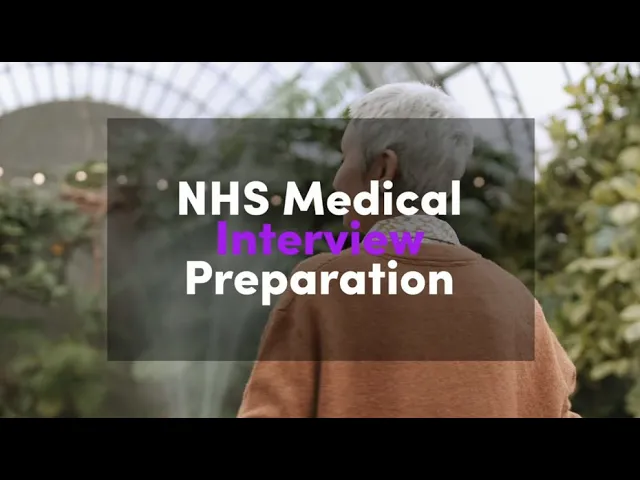Ethical Scenarios in NHS Interviews
18 Feb, 202312 Minutes
If you are asked to attend an NHS interview, you should always put plenty of work into preparation, as doing so will help you find success. One way to prepare is by looking at the type of questions which you’ll need to answer. In any NHS interview, you will get asked a range of questions to determine whether you are the best person for the position. One of those questions will more than likely revolve around an ethical scenario.
In this guide, we will explore what ethical scenarios are, the best ways of answering ethics-based interview questions, and a number of examples of questions that will give you a deeper understanding of the sort of ethical dilemmas you’ll be expected to address.
What is an Ethical Scenario?
An ethical scenario is a clinical situation where hospital staff must make a difficult decision regarding ethics, often concerning a patient. Ethics-based NHS interview questions will involve specific situations that occur in hospital settings. Your response needs to combine your clinical knowledge, experience, and ethical understanding to form a balanced answer.
Here are a few examples of the sort of ethical scenario questions you could be asked:
- “How would you respond to a colleague handling a situation unethically?”
- “How would you respond to a patient who requests a particular treatment that you don’t believe is in their best interest?”
- “Tell me when you faced an ethical dilemma?”
- “How would you respond if a patient doesn’t want to see a doctor of a particular race?”
- “How would you deal with a colleague that you felt had mistreated a patient?”
- “You suspect a colleague to be intoxicated at work – what do you do?”
- “A family disagree on the treatment options for their child”
As you can see, many of these ethical dilemmas address sensitive subjects such as racism, professional malpractice, and treatment refusal. These are issues that you are likely to encounter during a career in the NHS, so it is essential that you are well-equipped to deal with such situations.
There are a whole host of questions that are likely to come up depending on the speciality that you are interviewing for so if you require specific examples we have an extensive bank collated over years. You can download these in PDF guides according to your grade and specialism.
Why Are Ethical Scenarios Important in NHS Interviews?
- When an NHS hiring manager asks you about an ethical dilemma, they are testing you on a number of skills, including:
- Your understanding of ethics in the NHS. The NHS is one of the UK’s most valued public institutions and has a clearly defined set of ethics. Prior to your interview, it is essential to familiarise yourself with the NHS values, and you can check them out here.
- Your communication skills. Having excellent verbal and written communication skills is crucial for any NHS role. When your interviewer presents you with an ethical scenario, they’ll want to see how effectively you can communicate in a high-pressure situation.
- Your ability to see situations from other perspectives. Empathy is the bedrock of the healthcare profession. A deep understanding of a patient’s physical and emotional needs is an essential characteristic that NHS hiring managers look for.
- How you work under pressure. NHS departments are often characterised as fast-paced and high-pressure environments. Some ethics-based questions are designed to assess how you would cope with making vital decisions in stressful circumstances.
- Your ethical standards. Every NHS organisation needs to know that their hires have aligned ethics with their workplace. That way, they can be sure patients receive the best possible care.

The Four Pillars of Medical Ethics
The four pillars of medical ethics are principles every NHS organisation and staff member must adhere to. Prior to your NHS interview, it would be beneficial for you to become familiar with these principles. If your interviewer recognises that your answers to ethical questions are inspired by the four pillars, you will have clearly demonstrated your aptitude for ethical decision-making. We will explore each pillar in turn and examine how they each relate to answering ethical scenarios.
Autonomy
Autonomy is all about respecting and supporting a patient’s right to make decisions about their own healthcare. Regardless of what the best medical advice is, adult patients with decision-making capacity are entitled to refuse medical treatments and procedures. Informed consent is a core principle of the NHS, and it is likely that you’ll be presented with an ethical scenario that deals with the topic. In your answer, be sure to link back to the concept of autonomy and how that has shaped your answer.
Beneficence
Beneficence simply means doing what is best for the patient. Virtues like mercy, charity, and generosity should be at the forefront of every decision you make as a healthcare provider, and your sole aim should be to treat your patient to the best of your ability. With this in mind, make sure that your answer showcases your kindness and compassion.
Non-Maleficence
Non-maleficence is perhaps the most crucial pillar, meaning that no harm should be done. As a medical professional, your objective is to prevent and minimise harm wherever possible. Some ethical scenarios revolve around professional malpractice and how you would respond if you witnessed a member of staff mistreating a patient. Interviewers will want to know that you are familiar with the notion of non-maleficence, so be sure to bear it in mind when you give your answers.
Justice
Justice means treating all patients equally, regardless of race, gender, age, and other factors. As the Hippocratic oath states, ‘I will care for all patients equally and not allow prejudice to influence my practice.’ You should be completely objective in your role as a healthcare provider, treating all patients the same without fear or favor. You may be presented with an ethical dilemma involving resource allocation, and you’ll have to draw on your clinical expertise and ethics to come up with a solution. You should aim to ensure that your answer demonstrates you are aware of the significance of justice and how it informs your decision-making.
Using these four pillars will help you create a solution to the ethical scenario that will adhere to the NHS organisation’s expectation of ethics.
5 Tips for Answering Ethical Questions
The ethical scenario part of the NHS interview is understandably challenging. After all, there is rarely a right or wrong answer; instead, you must use your understanding of ethics and clinical situations to come up with the best solution for the patient. So here are some ways to answer in a way that will impress the interview panel.
1. Keep a Clear Head
Do not rush into your answer. Don’t be afraid to take an extra moment or two to carefully consider the question that’s been posed to you. This way, you’ll be able to answer the question in a calm, concise manner to the best of your ability.
2. Use the Four Pillars
The four pillars of medical ethics help form a solution that keeps ethics in mind. Make the effort to memorise them so you can think back to the four pillars for guidance if you are struggling to think of an answer.
3. Consider All Perspectives
When answering the question, be sure to talk out loud about various perspectives, including the patient, the patient’s family, and your colleagues. Doing this will demonstrate your empathy while showing that you consider scenarios from all sides.
4. Relate Your Actions to NHS Values
Don’t just tell the panel what you plan on doing – reiterate why you do what you do. Who does it benefit? When you take action, it’s important to give a reason. The NHS has a number of core values they expect every staff member to follow, so forming answers based on these principles will impress your interviewer.
5. Be Confident in Your Ability
It’s important to keep in mind that you are being interviewed for a reason. You have already demonstrated that you have talent, so allow yourself to be confident in your ability. After answering an ethical scenario, you could even bring up a real-life example of an ethical dilemma you’ve dealt with and the positive actions you took to resolve the situation.

The STAR Approach
Even if you have an excellent answer to the ethical scenario, that still won’t be enough if you don’t structure your answer clearly and concisely. That’s where the STAR approach comes in handy. Standing for Situation, Task, Action, and Result, the STAR method helps you organise your answer so that the interview panel will fully understand.
Situation
Begin by explaining the situation. Do this in a simple manner, proving that you understand the task at hand. Consider all the variables of the situation and which pillars or NHS core values you need to apply.
Task
Next, talk the interview panel through the tasks you plan on following, including the order. You can also explain why each task is necessary.
Action
After that, explain your actions to resolve the ethical dilemma. Be sure to give justifications for each action and how they align with your code of ethics.
Result
Lastly, explain the direct result of your proposed plan to the ethical scenario. At this stage, you can bring in the four pillars of medical ethics, showing how you adhere to each one.
Key Points to Remember
Before going into the interview, it’s a good idea to read the GMC guidelines and NHS constitution, as this will help you understand what ethical guidelines you’ll need to follow. Here are some other key points to remember when forming your answer:
The Duty of Candour
The Duty of Candour states that every professional must be honest with patients if something goes wrong or if something might harm the patient. It might involve telling the patient when something goes wrong, providing an apology, offering a remedy, or explaining the effects of the situation.
The Duty of Confidentiality
The Duty of Confidentiality provides the patient with privacy. It means that whatever is said between the doctor and their patient stays between them. However, there are exceptional circumstances where confidentiality might be overridden. For example, when the patient may prove harmful to themselves or others.
Competence and Capacity
If a patient cannot make a decision concerning their health care, you must figure out where that responsibility lies. It might be the power of attorney or an advanced directive from the patient.
The Law
Every medical professional must adhere to legal regulations. These regulations may surround scenarios like organ donations and abortions.
Keeping all of these points in mind when answering an ethical scenario question is crucial, as you need to adhere to all of them.

Example Ethical Scenarios
By their very nature, ethical scenarios provoke answers that aren’t always black and white. Difficult questions rarely provoke easy answers, and there are always shades of grey when it comes to addressing ethical dilemmas. To give you an understanding of the kind of scenarios you could be presented with during your interview, here are a few examples of ethical dilemmas and their respective answers:
Scenario 1
As a Specialist Registrar you hear that your Consultant is involved in a clinical drug trial. You believe he is fabricating data and submitting it for the trial. What do you do?
The GMC states that you must always conduct research with honesty and integrity. You therefore have a responsibility to act on concerns brought to your attention about the quality and integrity of research including allegations of fraud or misconduct. You must take action promptly, including:
- Taking account of participants’ safety
- Establishing the facts as far as you are able, separating genuine concerns from those made mischievously or maliciously
- Have systems in place to deal fairly and promptly with complaints and allegations of fraud or misconduct
As you only have suspicions at this stage, you should try and confirm the facts. The first step will be to discuss your concerns with the Consultant in question and what you may believe may have a simple explanation. If you are not satisfied with the response, you should inform the appropriate authority with your concerns. This may be the director of research, medical director, clinical director etc.
Scenario 2
You are due to a cardiac catheter list tomorrow and your father has been rushed into hospital in another city. He is going to have emergency surgery and your mother would like you to be with her during this upsetting time. What do you do?
This is a frequent scenario for doctors, where they have committed to patient responsibilities and their personal life becomes a conflict between the two. Patients must be able to trust that NHS doctors will save their lives and their wellbeing is always a priority. The GMC states that “you must make the care of the patient your first concern”.
It would therefore not be fair to abandon your cardiac catheter list as you would break the GMC code. You could then ask an experienced colleague to substitute for you. If you are unable to get a doctor to cover for you, your HR department might be able to organise locum cover to ensure patient care is not jeopardising patient care.
The GMC also states that as a doctor you “must always act quickly to protect patients from risk if you have good reason to believe that you may not be fit to practice”. Therefore, if you are very stressed and upset about your father being taken into hospital, you should declare you are unfit to practice.
Scenario 3
A patient’s wife’s solicitor has telephoned you to inquire about the diagnosis and prognosis of your patient. What do you do?
The GMC states the following: “Information about patients is requested for a wide variety of purposes including education, research, monitoring and epidemiology, public health surveillance, clinical audit, administration and planning. You will have a duty to protect all patients’ privacy and respect their autonomy.” When asked to provide information you should:
- Seek patients’ consent to disclose any information wherever possible, whether or not you judge that patients can be identified from the disclosure
- Anonymise data where unidentifiable data will serve purpose
- Keep disclosures to the minimum necessary
There may be certain circumstances where you have no choice but to disclose confidential information about your patient, for example if you are instructed to do so by a judge or to comply with a specific statutory requirement such as notification of a known or suspected communicable disease.
In this specific case, you do not have to tell the solicitor anything about your patient without the specific consent of the patient. When you are dealing with telephone queries, it is difficult to ascertain with whom you are talking to. It is therefore better to refuse to discuss issues on the telephone but to answer questions in writing after obtaining consent from your patient.
After you have obtained the consent, you should only disclose factual information which you can substantiate and present it in an unbiased manner. Post the Access to Medical Reports Act of 1988, your patient has the right to see written reports about them before they are disclosed. You should ask your patient if this is required.
In Summary
Ethical scenarios are a fundamental part of an NHS interview, as they assess a candidate's ability to navigate complex situations while upholding the core values of the healthcare profession. Responding to ethical questions requires a combination of clinical knowledge, ethical understanding, and effective communication skills.
Familiarising oneself with the four pillars of medical ethics—autonomy, beneficence, non-maleficence, and justice—can guide candidates in formulating well-rounded answers. It is essential to consider multiple perspectives, relate actions to NHS values, and use the STAR approach to structure responses coherently.
Candidates can showcase their ability to make informed decisions and provide compassionate care by demonstrating a sound ethical framework and an understanding of NHS principles.
Discover More About Our Work in NHS Recruitment
Ethical scenarios are notoriously difficult to answer, as they are some of the most challenging situations that medical professionals find themselves in. At BDI, we are passionate about helping top medical talent from all over the world to find their dream roles in NHS trusts all over the UK.
If you are an overseas medic looking to land an NHS job, we encourage you to get in touch today, and one of our consultants will talk to you about your aspirations. Alternatively, if you are an NHS trust seeking a talented medical professional to fill a vacant role, be sure to explore our client services pages to find out what we can do for you.



